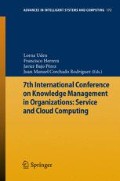Abstract
As the enhancement of Information Technology (IT) in various management fields escalates, the realization of knowledge management (KM) concept is considered as significant. This concept can be applied in considering information privacy as a component in designing a computerized system. Consequently, this paper proposes the adoption of explicit and tacit knowledge concepts in identifying the privacy of information components in order to construct a secured electronic medical record (EMR) system. A preliminary investigation involving interviews with a selected group of hospital information system (HIS) developers has been conducted earlier on. The findings of this study revealed four important components to be factored in any privacy preservation framework for HIS. They are namely, legislation, ethical, technology and cultural. By applying the KM concept into these four components, it can further derive more systematic guidelines in order to achieve the privacy preservation of information. Nevertheless, further research must be developed as to yield a more inclusive guideline in designing an EMR system that is reliable, specifically in addressing the need of securing patient’s personal medical information privacy.
Access this chapter
Tax calculation will be finalised at checkout
Purchases are for personal use only
Preview
Unable to display preview. Download preview PDF.
References
Samsuri, S., Ismail, Z., Ahmad, R.: User-Centered Evaluation of Privacy Models for Protecting Personal Medical Information. In: Abd Manaf, A., et al. (eds.) ICIEIS 2011, Part I. CCIS, vol. 251, pp. 301–309. Springer, Heidelberg (2011)
Smuts, H., van der Merwe, A., Loock, M., Kotzé, P.: A Framework and Methodology for Knowledge Management System Implementation. In: SAICSIT 2009, pp. 70–79 (2009)
Xiong, L., Xia, Y.: Report on ACM Workshop on Health Information and Knowledge Management (HIKM 2006). SIGMOD Record 36(1), 39–42 (2007)
Samsuri, S., Ismail, Z., Ahmad, R.: Privacy models for protecting personal medical information: A preliminary study. In: International Conference of Research and Innovation in Information Systems, ICRIIS 2011, pp. 1–5 (2011)
Liss, K.: Do we know how to do that? Understanding knowledge management. Harvard Management Update, 1–4 (1999)
Kankanhalli, A., Tanudidjaja, F., Sutanto, J., Tan, B.C.Y.: The Role of IT in Successful Knowledge Management Initiatives. Communications of the ACM 46(9), 69–73 (2003)
Chait, L.: Creating a successful knowledge management system. Prism (second quarter 1998)
Smith, E.A.: The role of tacit and explicit knowledge in the workplace. Journal of Knowledge Management 5(4), 311–321 (2001)
Petrides, L.A.: Knowledge Management, Information Systems and Organizations. EDUCAUSE Center for Applied Research (20) (2004)
Anthens, G.H.: A Step Beyond A Database. Computerworld 25(9), 28 (1991)
Maglitta, J.: Smarten Up! Computerworld 29(23), 84–86 (1995)
Shami Zanjani, M., Mehrasa, S., Modiri, M.: Organizational dimensions as determinant factors of KM approaches in SMEs. World Acad. Sci. Engin. Technol. 45 (2008)
Sanchez, R.: “Tacit Knowledge” versus “Explicit Knowledge” Approaches to Knowledge Management Practice (2005), http://www.knowledgeboard.com/download/3512/Tacit-vs-Explicit.pdf (accessed on January 2012)
Tuzhilin, A.: Knowledge Management Revisited: Old Dogs, New Tricks. ACM Transactions on Management Information Systems 2(3), 13 (2011)
Murphy, F., Stapleton, L., Smith, D.: Tacit Knowledge and Human Centred Systems: The Key to Managing the Social Impact of Technology. In: International Multitrack Conference of Advances in Control Systems (2004)
Sidek, Z.M., Abdul Ghani, N.: Utilizing Hippocratic Database for Personal Information Privacy Protection. Jurnal Teknologi Maklumat 20(3) (2008)
Blumenthal, D., Tavenner, R.N.: The “Meaningful Use” Regulation for Electronic Health Records. The New England Journal of Medicine 363(6), 501–504 (2010)
Whitley, E.A.: Informational privacy, consent and the “control” of personal data. Information Security Technical Report 14, 154–159 (2009)
Fischer-Hübner, S., Thomas, D.: Privacy and Security at risk in the Global Information Society. In: Loade, B. (ed.) Cybercrime. Routledge, London (2000)
Fischer-Hübner, S.: Privacy-Enhancing Technologies (PET), Course Description. Karlstad University Division for Information Technology, Karlstad (2001)
Swire, P.: Privacy Today, International Association of Privacy Professionals (2008), http://www.privacyassociation.org (accessed on March 2010)
Holvast, J.: History of Privacy. In: Matyáš, V., Fischer-Hübner, S., Cvrček, D., Švenda, P. (eds.) IFIP WG 9.2, 9.6/11.6, 11.7/FIDIS. IFIP AICT, vol. 298, pp. 13–42. Springer, Heidelberg (2009)
Moor, J.H.: Towards a Theory of Privacy in the Information Age. In: CEPE 1997 Computers and Society, pp. 27–32 (1997)
Karat, J., Karat, C.M., Broodie, C.: Human Computer Interaction viewed from the intersection of privacy, security and trust. In: Sears, A., Jacko, J.A. (eds.) The Human Computer Interaction Handbook: Fundamentals, Evolving Technologies and Emerging Applications, 2nd edn. Lawrence Erlbaum Associates, New York (2008)
De Ridder, C., Pretorius, L., Barnard, A.: Towards teaching Computer Ethics. Technical Reports (2001), http://osprey.unisa.ac.za/TechnicalReports/UNISA-TR-2001-8.pdf
MacIntosh, E.W., Doherty, A.: The influence of organizational culture on job satisfaction and intention to leave. Sport Management Review 13, 106–117 (2010)
Scheres, H., Rhodes, C.: Between cultures: Values, training and identity in a manufacturing firm. Journal of Organizational Change Management 19, 223–236 (2006)
Hicks, R.C., Dattero, R., Galup, S.D.: A metaphor for knowledge management: explicit islands in a tacit sea. Journal of Knowledge Management 11(1), 5–16 (2007)
Author information
Authors and Affiliations
Editor information
Editors and Affiliations
Rights and permissions
Copyright information
© 2013 Springer-Verlag Berlin Heidelberg
About this paper
Cite this paper
Samsuri, S., Ismail, Z., Ahmad, R. (2013). Adopting a Knowledge Management Concept in Securing the Privacy of Electronic Medical Record Systems. In: Uden, L., Herrera, F., Bajo Pérez, J., Corchado Rodríguez, J. (eds) 7th International Conference on Knowledge Management in Organizations: Service and Cloud Computing. Advances in Intelligent Systems and Computing, vol 172. Springer, Berlin, Heidelberg. https://doi.org/10.1007/978-3-642-30867-3_49
Download citation
DOI: https://doi.org/10.1007/978-3-642-30867-3_49
Publisher Name: Springer, Berlin, Heidelberg
Print ISBN: 978-3-642-30866-6
Online ISBN: 978-3-642-30867-3
eBook Packages: EngineeringEngineering (R0)

